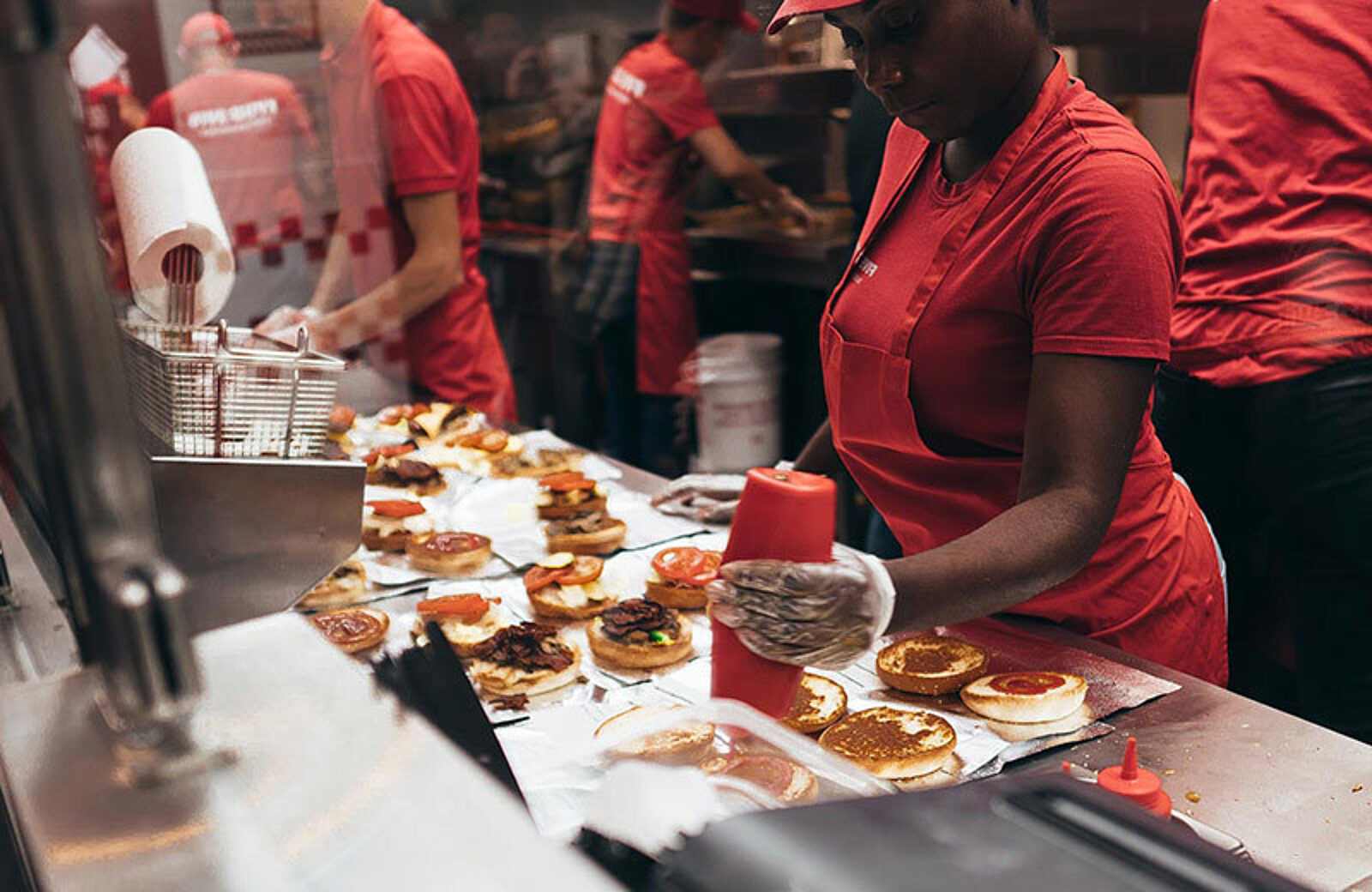
How to Prevent Employee Theft at Your Restaurant
If a staff member is under serious financial pressure, desperation can lead them to stealing. Here’s how to create a work environment that prevents theft altogether.

Kendal AustinAuthor
Revenue loss due to employee theft totals between $3 and $6 billion dollars annually and contributes to about 50% of small business failures within the first year.
So why is theft so prevalent? Let’s face it, restaurant work is tough, and sometimes it doesn’t pay enough to make ends meet. And even if you put all your efforts into hiring reputable and reliable staff members, when a human is feeling a serious financial crunch, desperate times can lead to desperate measures.
According to criminologists, theft happens because of a combination of motivation, opportunity, and rationalization.
Are your staff unhappy in their jobs and feeling like they’re being treated unfairly? That’s motivation.
Did they notice one manager doesn’t regularly produce sales reports? That’s opportunity.
Then, a small-ticket theft can be easily rationalized — “The owner doesn’t care about us, and I have bills to pay. A $20 bill will never be missed by the business.”
Opportunities for employee theft depend on the operations and setup of your restaurant, but to prevent theft generally, there are a few important things you can do to create a supportive and secure work environment that prevents the need for staff to steal in the first place.
How to Prevent Employee Theft
Pay your employees well and provide any benefits you can.
Before you start installing nanny cams, take a good, hard look at the environment you’ve created as an employer. Motivation and rationalization are two of the primary forces that cause employees to steal. But if you compensate them well and provide benefits that improve their quality of life, they’ll be less likely to end up in dire straits and feel the temptation to steal from their workplace.
The rising minimum wage in some cities has put a real squeeze on restaurateurs, but paying your staff a good, living wage is crucial for keeping employee happy and loyal.
If paying your staff more means raising your menu prices, explain the price change to your guests with a note on the menu — something like “we’ve recently raised our prices to help give our staff a better quality of life. They’ll understand, and you’re actually showing your community you care about your employees and enact your values throughout your business. And that kind of positive change can lead to customers being even more loyal to you.
It’s also worth noting that wage theft — when an employer steals from their employee — is also rampant in the industry. How rampant? From 2010-2012, the department of labor found labor violations, including tip and wage violations, in 84% of the restaurants they investigated, reported Eater, citing a New York Times editorial.
Being consistently shortchanged by an employer can definitely cause an employee to feel they have no choice but to steal. Quick tip? Don’t be that boss.
Create an open culture of helping and accountability.
Instead, be the kind of boss that an employee can come to for help. Provide resources for your staff’s physical, financial, and emotional health. Institute an open-door policy. Make a point to talk to your team about your own life and struggles, so they feel comfortable sharing their own experiences. And when you do offer to help, actually follow through.
Leslie-Ann Ciccone of (swah-rey), a dessert bar in St. Petersburg, Florida, prevents theft two ways, both by being open with her staff, and by happily giving away food or drinks and loaning equipment to any staff member who asks for it.
“I tell them: ‘ask us if you want to borrow something, I’ll probably let you borrow it, or I might have something better in the warehouse if you want to have a party or something,” she said in an interview on The Garnish podcast. “[And know] that everything here, Greg and I paid for, or we still owe on it. So just try to honor that, and just tell us what you need and we can probably do it.”
It all comes down to accountability, a value you should actively seek in potential staff members. In job interviews, ask candidates to share examples of when they’ve shown accountability, or when it’s improved a team they’ve worked on in the past. In turn, you can share how your team keeps each other accountable every day.
Provide free staff meals.
A ROC-NY and ROC Bay Area report found that nearly 30% of restaurant workers experience food insecurity, meaning they’re not certain if they’ll be able to afford their next meal. For an industry where workers are surrounded by food all day, this is a painfully ironic statistic.
And talk about motivation. If your staff can barely afford to feed themselves or their families, they could be driven to take food from your inventory.
One solution is to provide a free, filling (and ideally healthy and delicious) staff meals before a shift. Not only does it show your staff you care, but sitting down together for a daily meal can be an amazing boost for team morale.
Address issues head-on.
Let’s face it, working in restaurants is stressful. But if you’ve noticed that a staff member seems specifically resentful towards you, or is outright angry, you need to find out why and fix it. Sit down and have an open discussion, own up to any errors on your part, and do whatever needs to be done to defuse the tension. Maintain open and respectful communication with every staff member.
How to Identify Opportunities for Theft
Hopefully, being the best employer you can be is enough to prevent theft in the first place. But it never hurts to be aware of your weak spots. Here are five ways your staff could potentially take from your business, paired with specific methods to prevent it from happening.
1) Short Ringing
Here’s the scenario: On a busy night at the bar, a customer orders a $12 Grey Goose martini and pays for it in cash. The bartender takes the money for the top-shelf cocktail and puts it in the cash register, but rings it into the POS as a $7 well vodka drink. The customer is charged the appropriate amount, so they don’t know the difference.
At the end of the night, the bartender pockets the difference between the cash drawer total and what the POS expects it to be. This is most likely to happen in bars and nightclubs, but it's also possible in a quick-serve environment where cash transactions are being rung into the system near a cash drawer.
How to prevent it
The best preventative measure for short ringing is to implement a blind closeout process. Blind closeout requires employees to reconcile cash at the end of their shift without notifying them of the exact amount they are expected to return. They have to count the cash and report the total without knowing what it’s “supposed” to be. If a bartender’s been short ringing all night, it would be nearly impossible for them to keep a running total in their head of what the computer thinks the sales should be at the end of the night.
2) Too Many Comps
This is rarely done with malicious intent. Still, if a staff member is giving away too much product in the form of free drinks, appetizers, or desserts, or they’re a little too lenient with the friends and family discount, it can negatively affect your bottom line in a very real way.
How to prevent it
To keep better tabs on comped items, define and enforce a comp policy. You can have your staff write down every comp with an explanation, you can give bartenders a dollar value limit on freebies, or you can preemptively assign a “surprise and delight” budget to each server for every shift, like they do at Mei Mei in Boston, MA.
3) Voids After Closeout
Hopefully, you’ve got total trust in your management team. You’ve given them the keys to the building and the liquor cabinet after all, and made them responsible for operations on the floor. They’re also often the ones approving comps and voids in the system.
However, if a manager was looking to steal, they could easily void out cash transactions that occurred during the day, make it so the books balance out in the restaurant POS system, and take some cash for themselves.
How to prevent it
Keep a close eye on all voids, especially those made after close, and make sure you can check which manager is approving them.
4) Reusable Receipts
Here’s another scenario: A customer comes to the bar and orders a Bud Light, which is a common order at your bar. The bartender prints the receipt and the customer pays in cash. Instead of closing out the tab, the bartender leaves it open. Fifteen minutes later, a different customer orders a Bud Light. Instead of entering it in the POS system as a separate check, the bartender reprints the first customer’s receipt from the still-open tab. When the second customer pays for their beer, the original check is closed, leaving the cash from that first order unaccounted for and in the hands of the bartender.
How to prevent it
Leverage the data in your POS to keep an eye on reprints. If there’s a trend in increased reprints from one server or bartender, approach them — with empathy, and without accusations — and see if there’s a good reason for the increase in reprints.
5) Register Skimming
Register skimming is when an employee simply takes a small amount of money from your cash register. Restaurant owners who don't track their sales reports are much more susceptible to this, and it’s more common in smaller, independent restaurants that don’t have reporting systems in place.
How to prevent it
Modern restaurant tech will make any thefts obvious: It’ll alert you to any mismatches between what’s supposed to be in the cash register and what’s actually there. Also, if your employees know how great you (and your system) are about tracking all your sales, you’ll likely avoid this type of theft altogether.
One-on-One Meeting Template
Make weekly, biweekly, or monthly check-ins with employees productive with this customizable Word doc for your one-on-one meeting agendas.

How to Handle Suspected Employee Theft
If there’s a disparity in the cash drawer or a missing order of steaks, rule out every other possibility before going to your employees with an accusation. Could you have under-ordered the missing item, or did it get left behind by a delivery driver? Could there have been an issue with giving incorrect change? Triple-check that theft is 100% the cause. It’s a terrible feeling to be accused of theft when you’re actually a totally trustworthy employee.
If you’re absolutely certain a theft has occurred, speak to your entire team instead of accusing an individual. At a staff meal, tell them you’re upset to have to bring them this news, but that it looks like [insert item or amount of money] is missing. Explain that you’ve checked all other possible reasons. Then, give a penalty-free window for the item or money’s safe return — for example, tell them that if it’s returned within three days, there will be no consequences, either legal or in terms of their employment.
If the item or money is returned within the time frame, sit down with the employee who returned it. Find out what’s going on with them and why they took it. There are many approaches here, but some of the restaurateurs we spoke to for this story said they'd give second chances but not a third, and that they'd let them go it happened again. Hopefully, they’ll be grateful for the second chance and come to you if they’re in trouble instead of stealing.
If it’s a situation where you know a specific employee has stolen something — if they were caught on camera or a team member you trust has come to you to tell you what’s going on — approach them with empathy, and try to find out why it happened. If they’re being hounded by creditors or if they can’t put food on the table, see if you can provide the resources they need. If there’s no real reason for the theft, it’s reasonable to let this employee go. Pay their last paycheck in full, and tell them their tenure at your restaurant is over, effective immediately.
If you’re inclined to pursue legal action against an employee, or if you want to tell your whole team that legal action will be taken against whoever is responsible for the theft, consult a lawyer before you do so. You might find out that you don’t have a strong case or that the process will be more expensive than the loss of the missing item or money. It could be worth cutting your losses and moving on.
Related Restaurant Resources
That's it.
If you can create a fulfilling work environment where employees feel a sense of ownership in their work, and if you pay them well enough that they’re never in a state of financial desperation, there’ll be less impulses to steal. Be diligent about sales reports, invest in modern restaurant tech, and develop a clear and fair comps policy to keep your operations in good shape.
Is this article helpful?
DISCLAIMER: This information is provided for general informational purposes only, and publication does not constitute an endorsement. Toast does not warrant the accuracy or completeness of any information, text, graphics, links, or other items contained within this content. Toast does not guarantee you will achieve any specific results if you follow any advice herein. It may be advisable for you to consult with a professional such as a lawyer, accountant, or business advisor for advice specific to your situation.
Read More
Subscribe to On the Line
Sign up to get industry intel, advice, tools, and honest takes from real people tackling their restaurants’ greatest challenges.

